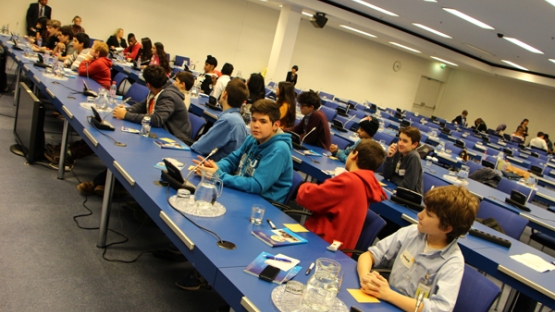Do you remember what you wanted to be when you were younger? Perhaps you remember meeting someone who ignited a spark that would lead you on a fulfilling professional path later in life.
Bring your Child to Work Day took place on 5 December, and the IAEA invited the children of staff members to learn more about the Agency and the various activities and work that take place day to day. The day was full of experiences, learning and interaction, which would help the children learn about the paths they may take in the future.
The students, aged between 13 and 17, were invited to spend the day at the IAEA and to attend various tours, presentations and demonstrations. The event aimed to provide the children with knowledge of how the peaceful uses of nuclear technology benefit the world, and to inspire them to think about being the next generation of scientists and leaders. The children visited the IAEA's Incident and Emergency Centre, and discovered how the IAEA responds to radiological incidents and emergencies, and were also given a presentation on Fukushima related activities. The youngsters were able to visit the Isotope Hydrology laboratory and the Satellite Imagery laboratory, and to explore the IAEA's printing and publishing operations and individual radiation monitoring services.
The late afternoon was dedicated to a session on the technical cooperation (TC) programme, the main mechanism through which the IAEA delivers services to its Member States. This interactive session described how a technical cooperation project is planned using the logical framework approach. Breaking into pairs, the older children worked on designing problem and objective trees, a key analytical step in project design which is used to identify problems and solutions.
The younger students were able to interview Programme Management Officers from the Department of Technical Cooperation. These officers work directly with Member States to develop, implement, manage and monitor the TC programme. The officers spoke to the students about their education, experiences and achievements. They described how they came to be working within a UN organization, what a normal day in the office is like, and what their duty trips to Member States entail. The students had plenty of questions for the officers, ranging from what they like about their jobs, to their greatest achievements. The officers not only provided students with a lot of information, but also managed to convey the personal passion that drives their work and the sense of satisfaction gained from seeing the achievements of the projects they are part of around the world.




